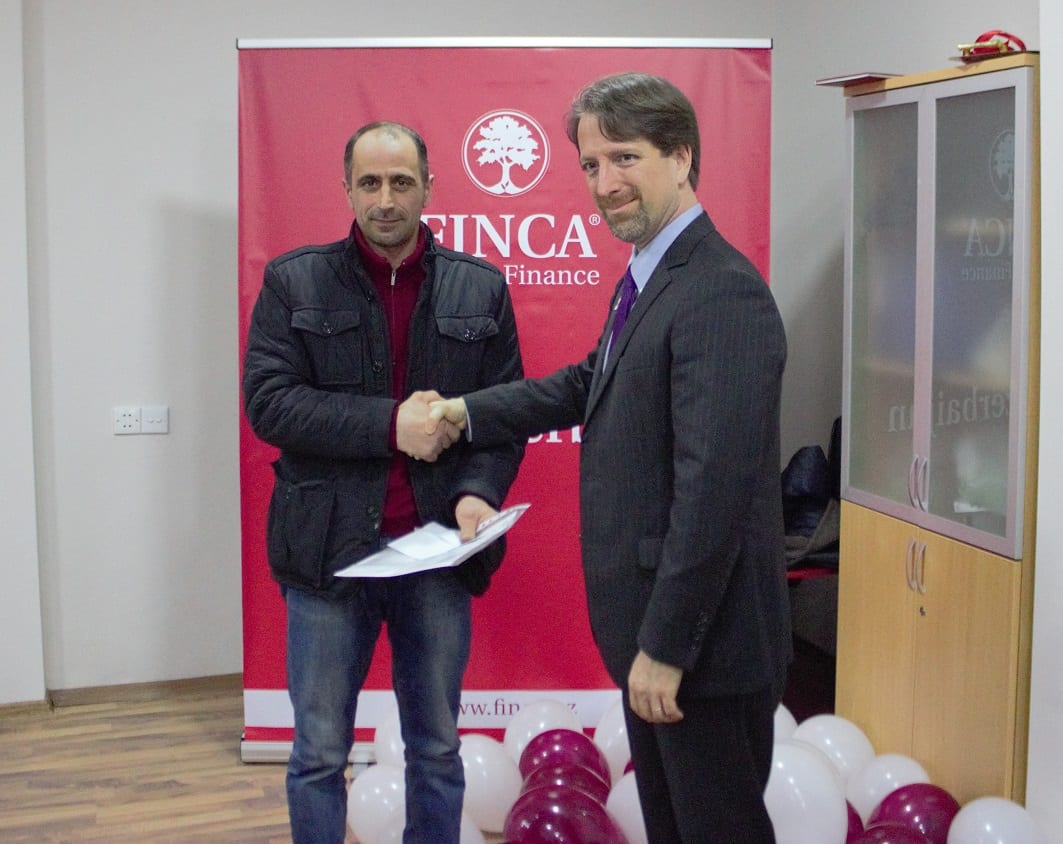FINCA Azerbaijan to Meet Need for Financial Inclusion With Transformed Business Model
In 2014, Azerbaijan was home to FINCA Impact Finance’s largest subsidiary with a total loan portfolio of $250 million. Serving 165,000 clients in a country with the need for financial inclusion, the FIF network had come to expect FINCA Azerbaijan to be a high performer.
Then crisis hit. A regional recession and currency crisis spilled over into Azerbaijan. A fall in the price of oil also tore a hole in the country’s export earnings. Over the course of 2015, it became difficult for the Central Bank of Azerbaijan to peg the national currency, the manat, to the US dollar. The currency lost a lot of value.
Many of FINCA Azerbaijan’s clients, mostly micro and small entrepreneurs, were unable to repay their loans. “Delinquencies started to soar. Panic ensued in the market”, said FINCA Azerbaijan CEO Timothy Tarrant.
While the institution spent 2016 continuing to provide responsible finance amid a worsening financial crisis, issuing new loans stopped being commercially viable.
“When we stopped lending, in April of 2017, that was when I hit rock bottom. Once we stop lending, the message gets out in the market that this institution is on its deathbed”, said Tarrant.
What had been one of FIF’s most reliable subsidiaries was in serious trouble, forced to close 56 branches in a span of less than three years. By the end of 2017, FINCA Azerbaijan had fewer than 100 employees, down from roughly 1,300 when the crisis hit. Bankruptcy was being floated as a serious option.
The institution’s dedicated staff refused to give up, however. Serving mostly rural communities with a need for financial inclusion, staff put in long hours, working with clients to restructure loans and accept partial payment when necessary.
“I thought, okay, we’ve maybe got a one-in-five chance of getting through to the other side. But the staff stayed and kept doing their best, and sometimes lost their jobs and still stayed”, continued Tarrant.
Watch FIF’s new video about FINCA Azerbaijan here:
Successful Business Model Transformation
Leadership began looking at ways to make the business model more efficient and resistant to external shocks. The idea was that once it did resume lending, the institution would be able to reach more clients without increasing overhead costs.
“Almost from the beginning, we did understand that we would have to change the business from the ground up if we were going to have a chance to survive. Part of our effort to do that was to build a call center”, Tarrant explained. The call center would centralize the collections process – rather than sending agents into the field to collect repayments, it would be done from a single room at FINCA Azerbaijan’s HQ office.
“My expectation was, okay, let’s hope the call center is able to get us as good [of a result] as the field collector. It actually gave us a result that was three times better than the former approach.”
The success of the call center owed much to its ability to optimize both efficiency and personal touch. FINCA Azerbaijan didn’t stop interacting with its clients – it started reaching them through a different channel.
“We took an individual approach with the clients”, said Zarina Rasulova, the call center’s supervisor. Call center staff worked with clients just as a field officer would. Collections were much higher than expected. “Every good result gave us hope and kept us going”, said Rasulova.
The call center has been a model for FIF’s wider digital transformation. Now, subsidiaries across the FIF network are centralizing collections to increase efficiency without compromising trust-based relationships with clients.
FINCA Azerbaijan also fully centralized its loan underwriting process – the first FIF subsidiary to complete the process – and plans to implement automated credit decisioning and digital field automation (DFA) later this year.

New Growth Strategy for 2019
In December, FINCA Azerbaijan disbursed its first new loans in nearly two years. It now has a growth strategy that includes eight new branch openings scheduled for 2019.
Despite the new openings, however, the institution has no plans to return to its previous business model. Now a scaled-down, more efficient operation, it will expand financial inclusion through a combination of branches and digital banking channels.
Tarrant had this to say:
“This will be the foundation that we use to rebuild the organization. Not to what we had before, but to a new FINCA. We still embrace the client, we embrace the team, we embrace the mission. But now we’re going to do it in a different way. An efficient way and a sustainable way.”